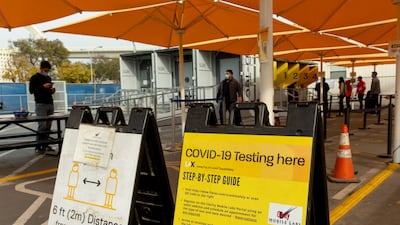Live updates: follow the latest news on Covid-19 variant Omicron
New restrictions are coming into force around the world as authorities try to stem the spread of the Omicron strain of Covid-19.
France shut nightclubs for four weeks, New York City called for a private sector vaccine mandate and Hong Kong imposed quarantine requirements on more countries.
South Africa’s rate of positive tests climbed to 26.4 per cent, but the surge has not overwhelmed hospitals so far, prompting some cautious optimism that Omicron may cause mostly mild illness. Experts said it is too soon to draw conclusions, however.
The variant has reached Russia and Fiji, and is spreading in the UK.
In Russia, two people who had recently returned from South Africa were diagnosed with the country's first cases of the omicron variant, the country’s health watchdog said on Monday.
All citizens arriving from southern Africa will be quarantined in a special observatory, where they’ll face daily PCR testing, the agency said.
Australia’s New South Wales state said genome sequencing has confirmed an additional six omicron cases contracted from an outbreak in Sydney’s western suburbs, bringing the number of locally acquired infections to 20. Including international arrivals, the state has found 31 cases of the variant, none of whom have been admitted to hospital, health officials said on Tuesday.
The source of the Western Sydney outbreak is believed to be a returning traveller who spent time in Nigeria and arrived on a flight from Doha on November 23.
Meanwhile, in New York, Governor Kathy Hochul is ordering about 30 hospitals in the state to halt elective surgeries amid a surge in Covid-19 admissions.
Coronavirus hospitalisation has surged 80 per cent in New York in the past month. An executive order that took effect on December 3 allows the state health department to limit non-essential procedures at hospitals with limited bed capacity.
As of Thursday, 56 hospitals had a bed capacity of 10 per cent or less, including Albany Medical Centre Hospital, Mercy Hospital of Buffalo, Long Island Jewish Medical Centre and Mount Sinai Hospital in New York City, according to the state health department.
French nightclubs to close
France's lawmakers announced the country will close nightclubs for four weeks and open vaccination to vulnerable kids, in a bid to prevent hospitals from getting saturated this winter as the number of new Covid-19 cases rises to around 40,000 per day.
The country could open vaccination to children between ages 5 and 11 by early 2022, Prime Minister Jean Castex said. He recommended the French avoid large gatherings and try to work remotely. Health measures will also be strengthened in schools, he said.
“A curfew, a lockdown would be disproportionate, but the situation requires individual and collective efforts,” Castex said during a press conference in Paris. “We shouldn’t panic. While the number of cases is high, the situation isn’t the same as a year ago, as the French are massively vaccinated.”
Mr Castex said that without the high immunisation level – around 90 per cent of adults are vaccinated – hospitals would already be saturated, “and we would probably have a lockdown like in other European countries.”
Germany’s incoming chancellor, Olaf Scholz, named a high-profile health expert who has taught at the Harvard School of Public Health to tackle a brutal surge in Covid-19 infections.
The Social Democrats’ Karl Lauterbach, a professor of epidemiology who has become a public figure during the pandemic, will be Scholz’s health minister when the new government is sworn in on Wednesday.
Scientists have begun looking into how the new Omicron variant has begun to spread so quickly.
According to researchers, some of the hypotheses about its development include that the strain emerged from an area where genomic surveillance is low or people have little access to health care. Alternatively, it could have developed in an immunosuppressed person, who would have harboured the virus for a lengthy period, allowing it to mutate.
Another hypothesis is that the virus could have crossed back into an animal population, mutated, and then reinfected humans.










